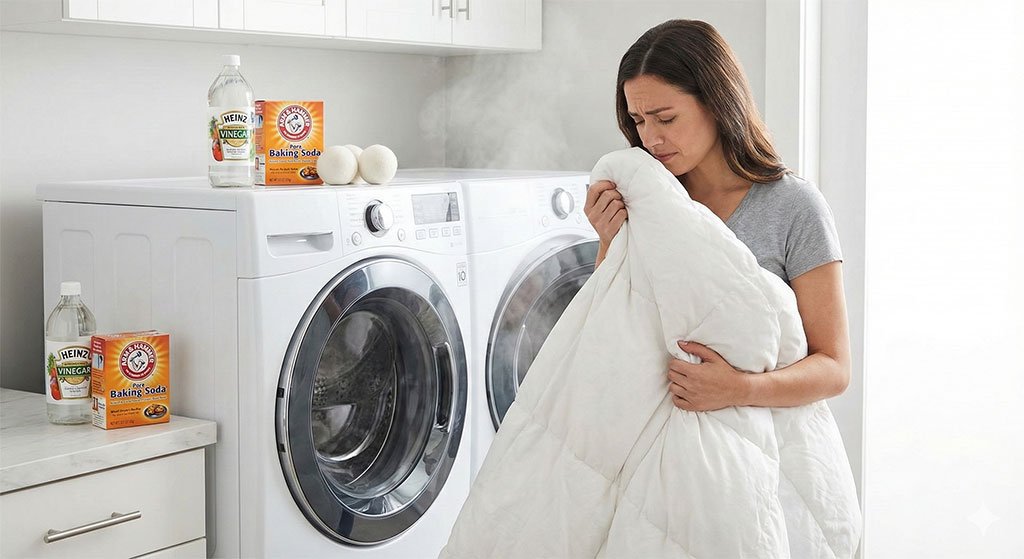Drying clothes in the bedroom can cause excess moisture and mold growth, leading to potential health issues. It’s not recommended due to the potential negative impact on air quality and health.
Drying clothes in the bedroom may seem convenient, but it can have adverse effects on the indoor environment. The moisture released during the drying process can increase humidity levels, creating a breeding ground for mold and mildew. Additionally, It may lead to poor air quality, exacerbating respiratory conditions and allergies.
To maintain a healthy living environment, it’s advisable to utilize designated drying areas or outdoor spaces for drying clothes.
Table of contents
The Negative Impact Of Drying Clothes Indoors
Drying clothes indoors can have negative impacts on your health. It can lead to mold and mildew growth due to the increased humidity, which can worsen indoor air quality and trigger respiratory issues.
The chemicals from laundry products can also contribute to indoor air pollution, potentially aggravating asthma and allergies. It’s important to be mindful of the potential health risks associated with indoor drying and consider alternative methods to maintain good air quality.

Is Drying Clothes In The Bedroom Harmful?
Drying clothes in the bedroom might lead to excess moisture and mold growth, impacting indoor air quality. The moisture from damp clothes can create a breeding ground for dust mites and allergens, potentially causing health issues. It’s better to air-dry clothes in a ventilated area to prevent these problems.
Best Practices For Indoor Drying
Drying clothes indoors can be problematic, as it can lead to excessive moisture and potential mold growth. When choosing a location for indoor drying, opt for well-ventilated spaces with good airflow to prevent moisture buildup.
Using dehumidifiers or air purifiers can help maintain a healthy indoor environment. It is essential to select safe and efficient drying methods such as utilizing drying racks and lines. Additionally, consider implementing strategies for faster drying times by maximizing airflow and using absorbent materials.
Environmental And Sustainable Alternatives
When it comes to drying clothes in the bedroom, it’s important to consider the environmental impact. Understanding energy consumption is crucial in evaluating indoor and outdoor drying options. Comparing the energy usage of indoor and outdoor drying methods can help to make informed choices.
Additionally, renewable energy options for drying, such as solar and wind-powered solutions, can significantly reduce carbon footprint and emissions. Line drying is another eco-friendly alternative that offers numerous benefits. It not only saves energy but also helps in preserving the fabric quality. Moreover, eco-friendly laundry solutions like using plant-based detergents and water-efficient washing machines can further promote sustainability.
FAQ
Is Drying Clothes In The Bedroom Bad For Your Health?
Drying clothes in the bedroom can increase humidity levels and promote mold growth, which can have negative effects on respiratory health. It’s best to avoid this practice to maintain a healthy indoor environment.
How Does Drying Clothes In The Bedroom Affect Air Quality?
Drying clothes indoors can release excess moisture into the air, leading to higher humidity levels and potential mold growth. This can degrade indoor air quality and may exacerbate respiratory issues, especially for those with allergies or asthma.
Can Drying Clothes In The Bedroom Cause Mold Growth?
Yes, drying clothes indoors, especially in the bedroom, can increase humidity levels and create a conducive environment for mold growth. This can lead to various health issues and impact the overall air quality in your home. Consider using a well-ventilated laundry area instead.
Final Words
Ultimately, drying clothes in the bedroom can lead to excess moisture and mold. It’s crucial to consider the potential health risks and take necessary precautions. By using alternative methods and proper ventilation, we can maintain a healthier indoor environment. Making informed choices about how we dry our clothes can positively impact our overall well-being.


